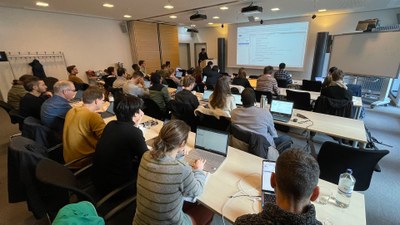12.03.2024
Machine learning (ML) is becoming increasingly important in climate science and at DKRZ. However, scientists often face major challenges when they want to apply ML concepts to climate data, as these can differ significantly from typical machine learning datasets. In addition, ML is a branch of computer science that is currently developing very dynamically - making it difficult for non-specialists to keep track. For these reasons, DKRZ has developed an introduction to machine learning specifically for the field of climate science for its users.
 The hands-on workshop was organized and conducted by a five-member team consisting of Adeniyi Mosaku, Dr. Paul Keil, Harsh Grover, Dr. Étienne Plésiat and Johannes Meuer; the 20 participants came from more than ten German institutions.
The hands-on workshop was organized and conducted by a five-member team consisting of Adeniyi Mosaku, Dr. Paul Keil, Harsh Grover, Dr. Étienne Plésiat and Johannes Meuer; the 20 participants came from more than ten German institutions.
In addition to an introduction to ML basics, the workshop program included typical application examples, an overview of ML tools and frameworks as well as application examples from weather and climate research. Dr. Étienne Plésiat demonstrated PyTorch, a widely used ML framework. Using interactive Jupyter notebooks, participants learned how to create their own training, validation and test data sets and build a Convolutional Neural Network (CNN), which they could then use to train and test their models. Finally, Johannes Meurer presented an advanced use case in which missing climate data can be reconstructed using ML methods.
The participants were very interested and many of them said after the workshop that they wanted to use the methods they had learned for their own research. Due to the high demand and positive feedback, there is a good chance that the workshop will be repeated soon.
Further information and complete workshop program: https://indico.dkrz.de/event/60
